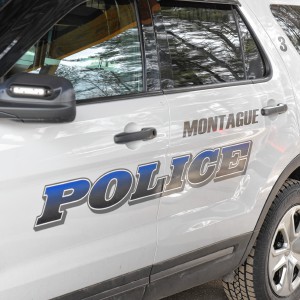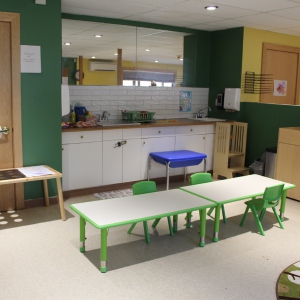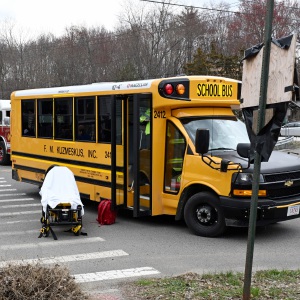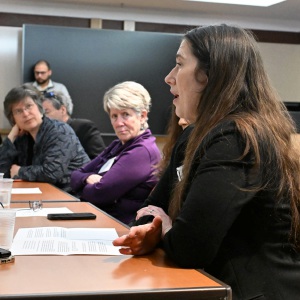Comerford: Free community college plan will lift up students, offer immediate return on investment

Holyoke Community College anticipates enrollment would go up about 8% next school year if a plan unveiled Monday by Senate Democrats to offer community college free for all students is approved this summer. STAFF FILE PHOTO
| Published: 05-08-2024 5:26 PM |
A plan unveiled by Senate Democrats on Monday to make community college free for all in Massachusetts starting this fall has the potential to have a big impact for prospective students across the state.
The “MassEducate” plan would invest $75.5 million to cover tuition and fees for all residents, and offer a stipend to lower-income students for books, supplies and other costs. That’s on top of already existing programs that provide free community college for residents over 25 and for free nursing programs, bringing a total of $117.5 million for universally free community college.
Sen. Jo Comerford, a Northampton Democrat whose district includes much of Hampshire and Franklin counties, said the idea of the plan is to create a “cradle-to-career” investment for public education in Massachusetts.
“I think of public education as an equity engine, and I also think of it as an economic development engine,” said Comerford, Senate chair of the Committee on Higher Education. “For community colleges, the majority of students are of color. The majority are low-income. So we are affording them an opportunity at an education that will be exceedingly useful for their own aspirations and personal gain.”
Comerford helped unveil the plan on Monday during an event at Middlesex Community College in Lowell that included Senate President Karen Spilka, other Senate leaders, the presidents of the state’s 15 community colleges, business leaders, students and advocates.
Variations of free community college programs already exist in several other states like Tennessee, Oregon and Texas. Comerford said that results from those states showed significant improvements in the economy and on individual incomes.
“We can think about it in terms of helping attract new employers to the commonwealth, who are going to bring their own taxes and revenue and create jobs,” Comerford said. “There’s an immediate return on public investment for this.”
Greenfield Community College Dean of Enrollment Management Patrick Tanner said that, alongside double-digit enrollment increases for the second consecutive semester, the MassReconnect program, which provides free college for those 25 and older, caused a roughly 30% increase in students ages 25 or older.
Article continues after...
Yesterday's Most Read Articles
 Report: Montague Police internal affairs investigation ‘biased’
Report: Montague Police internal affairs investigation ‘biased’
 Laid-off Kennametal employees ponder what’s next
Laid-off Kennametal employees ponder what’s next
 Greenfield native Sam Calagione, founder of Dogfish Head Brewery, to throw out first pitch at Fenway Park on Friday
Greenfield native Sam Calagione, founder of Dogfish Head Brewery, to throw out first pitch at Fenway Park on Friday
 My Turn: Call us Cinderella Town
My Turn: Call us Cinderella Town
 Springfield man held without bail in case of September foot pursuit in Greenfield
Springfield man held without bail in case of September foot pursuit in Greenfield
 Real Estate Transactions: April 18, 2025
Real Estate Transactions: April 18, 2025
Tanner said “MassEducate” would propel the college’s goal of expanding access to higher education and workforce training, and, if passed, would likely cause a spike in enrollment and, consequently, staffing.
“Our role, our mission in the community and in the region, is to be that provider of higher education, but also to function as a hub for workforce and economic development,” Tanner said. “Any external levers that are switched to help us to do that in greater numbers is welcomed by us. We are eager, we are excited to welcome new students. If we need to increase our staffing levels, we will absolutely do that.”
If approved, Tanner said it would be important that the funding stay consistent so that students do not enroll in GCC under the expectation that they can attend classes tuition-free, only to have to pay in future semesters.
“It’s not just this Legislature that would need to pass it. ... We don’t want to be in the position of telling students, ‘Hey, we had this legislation last year and it was funded, but it’s not funded this year,’” Tanner explained.
At Holyoke Community College, around 500 of the 3,700 enrolled students are funded through the MassReconnect program, according the school’s interim Dean of Strategic Recruitment Initiatives Mark Hudgik.
Hudgik said adult student enrollment increased about 8% since the inception of MassReconnect, and the college anticipates a similar increase for the overall student body if the new MassEducate plan were to pass.
“I think it would open up a lot of opportunities for students who may not have been eligible prior, and for whom the idea of paying for college is scary and a little bit of a burden,” Hudgik said of the proposed plan.
According to Hudgik, the plan would act essentially as an extension of the financial aid system given to students. Students would still need to fill out the Free Application for Federal Student Aid (FAFSA) form to receive the aid, and as long as the student is over the age of 18, they would be approved for MassEducate.
“Students would apply for financial aid like they would regularly, and then once all other factors are considered, if there still remains a gap then this program would kick in,” he said. “It’s really more of a promise from the commonwealth that they will cover students’ unmet needs.”
Senate Democrats’ higher education proposal marks a departure from the House budget, which allocates $24 million for MassReconnect but does not fund universal free community college. Gov. Maura Healey had also recommended funding MassReconnect at $24 million, a $4 million increase over the current fiscal year’s spending for the nascent program.
The funding discrepancy is likely to be hashed out in closed-door budget negotiations this summer, as lawmakers determine the best way to deploy $1.3 billion in surtax revenues on education and transportation investments.
Should the program be approved as part of the state’s fiscal year 2025 budget, then students could begin attending community college for free as soon as next semester.
“It’s been a year-long conversation with the community college campuses and their faculty, staff and students,” Comerford said. “I think it’s important we see this inside the larger scope of pre-K through public higher education. From the education of our youngest to the education of our higher education students, we need significant investments across the board.”
Spilka’s office said community colleges attract a different demographic than four-year colleges in Massachusetts, including more diversity in age and minority backgrounds.
“We know if we want a generation of students to benefit from the terrific programs at our many community colleges across our state, we must remove the barriers to entry — as many or all of them, if possible,” Spilka said Monday morning at Middlesex Community College in Lowell.
When the Senate president first rolled out the idea in January, reporters asked if the promise of free community college would divert students who otherwise would have gone to four-year institutions to community colleges instead.
“I think in the long-term this is going to absolutely be a benefit to the four-year institutions, both state universities and UMass, I think because of that transfer factor,” replied Mount Wachusett Community College President James Vander Hooven, who was also at Monday’s press conference.
“We’re already seeing a significant increase in students over 25 whose other alternative was to not go to college at all,” Vander Hooven said. “So there’s a pipeline. I’ll just speak for myself, the relationship that we have with Fitchburg State at Mount Wachusett Community College — we’re at the table all of the time, putting together these transfer pathways for students between community college and state university.”
Alexander MacDougall can be reached at amacdougall@gazettenet.com. Material from State House News Service was used in this report, and Greenfield Recorder Reporter Anthony Cammalleri contributed.






 Expanding child care options: Hilltown Children’s Center opens in Shelburne
Expanding child care options: Hilltown Children’s Center opens in Shelburne ‘Courage, not acquiescence’: McGovern encourages increased engagement during Trump administration
‘Courage, not acquiescence’: McGovern encourages increased engagement during Trump administration Vehicle collides with school bus causing minor injuries in Montague City
Vehicle collides with school bus causing minor injuries in Montague City AG pledges to help fight opioid crisis in visit to Greenfield
AG pledges to help fight opioid crisis in visit to Greenfield
